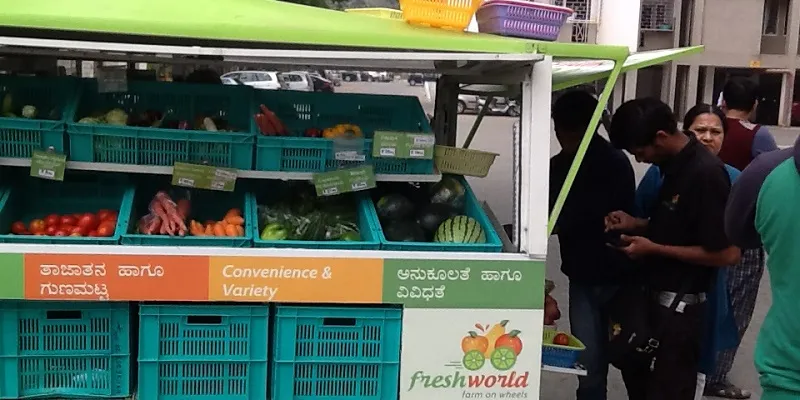From Rs 40 lakh to Rs 6 crore, this startup is modernising the way we buy fruits and vegetables
Freshworld uses battery-operated carts (e-rickshaws) along with a modern POS and an app to deliver farm-fresh fruits and vegetables to the customer's doorstep
We all love eating farm-fresh fruits and vegetables. But sometimes, the vendor doesn’t show up, or we miss out on them by a few minutes, or we just don’t have the exact change in cash. What if there was a pushcart vendor with battery-operated rickshaw designed to hold fruits and vegetables, which accepts digital payments, has a POS machine to capture orders, and has an app that could update the delivery routes?
This is what FreshWorld has been doing for eight years now. The Bengaluru-based startup was founded by Rajiv Rao, a senior corporate executive, who gave up a well-paying job to build the future of consumption. Freshworld claims to have served over 50,000 loyal customers till now.

The Freshworld cart in a Bengaluru neighbourhood
"The age-old street vending format of selling fruits and vegetables, while still cornering a major share in the customers’ purchase pie, has not undergone any change in its delivery mechanism or upgraded to a more refined model of vending. This is in stark contrast to the huge transformations that all other sectors touching customers’ lives have undergone, like mobile and banking to just name a few," says Rajiv.
FreshWorld retails farm-fresh fruits and vegetables at the consumer's doorstep in a more organised and professional format – through an app. The pushcart vendor shows right at the doorstep of the customer. The vendor, who previously had to use their physical strength to push the vegetable cart, now plans the routes in a suburb, notifies the customer through the customer app, and arrives in each lane by a set time for the consumer.
"We reduce intermediaries by moving up the production chain and retail the farm produce using battery-operated pushcarts. We provide an organised retailing experience at the consumer’s doorstep," says Rajiv.
How it operates?
FreshWorld uses GPS-equipped carts and ensures the customers are served on time. The startup has culled out the traditional fixed POS environment, ported it onto an Android tablet with a billing app, and provides a digitised bill for every transaction. The startup informs customers by way of SMS on time, variety, and price.
The second is the innovative display and product variety. The startup offers over 60 varieties of F&V on a touch-and-feel, pick-and-choose model to consumers.
The third USP is the professional and transparent way of reaching consumers.
"We are committed to the route plans and serve all customers. All rates displayed are those that we directly sourced from the farms, with our margins added," says Rajiv.
What problems it aims to solve?
The startup says its 'Pick and Choose' model is what resonates with Indian customers.
"The company has achieved this by being the single intermediary between the producer and the consumer. It procures directly from farmers while delivering the fresh produce to the end consumer using modern, innovative, and cost-effective delivery mechanisms," says Rajiv.
And in the process, it claims to have solved two problems. Firstly, fruits and vegetables are a high repeat category, and they need to be available closer to the consumer who prefers to buy on a ‘Touch and Feel’ basis, rather than from ecommerce sites. The continued proliferation of kirana and the ubiquitous pushcart operator reiterates these consumer needs.
However, while they provide a retailing opportunity to the consumer, both of these channels are largely unorganised. Differential pricing, inconsistent quality, limited variety, poor procurement practices, and outdated consumer experience of the pushcart operator have not allowed them to cash in on the digital experience. This is what Rajiv wants to change.
The second problem it is trying to solve is while organised retailing has proliferated over the last decade, the industry is grappling with high setup and capital costs, high manpower costs, and ever-increasing rental costs.
"This makes the unit economics extremely challenging and daunting. Online/hyperlocal formats do not provide for touch and feel, and also have unviable last-mile delivery costs. FreshWorld marries the art of street vending with the science of modern retailing. We provide an organised retailing technology-enabled experience at the consumer's doorstep. Fruits and vegetables are not really an impulse purchase category and allow for committed, time bound regular purchases. What we therefore do is service customers on scheduled routes/beat like a Permanent Journey Plan (PJP). This gives the customers the confidence that they will have regular access to a refined and superior quality retailing experience," says Rajiv.
He says, all this is being done through an innovative and economical model, addressing legacy issues of modern retail like high capex, unreasonable rents, and high manpower costs.
FreshWorld aims to become the ‘QSR’ format of retailing fruit and vegetables. Also, the startup says that it reduces one lakh kg of CO2 per year on account on not using diesel vehicles.
The founder
Rajiv Rao is a Commerce graduate from Christ College, Bangalore University ('93), and has a Post-Graduate Certification in Business Management from XLRI, Jamshedpur.
He has been an operation professional with 25 years of experience – 15 years of which have been spent in telecom and internet services markets.
Prior to becoming an entrepreneur, Rajiv had been the CEO of MYA – a rural supply chain solutions company dealing largely in milk collection and distribution. Here he identified an opportunity in the Fruits and Vegetables (F&V) business. He went about setting up farmer facing units, operational processes, the supply chain process, and the infrastructure for the F&V business, and established FreshWorld in 2012.
In the same year, he debuted the model to the local municipality, which was thrilled about the idea of changing the lives of pushcart vendors with battery-operated rickshaws. He started with five carts and invested Rs 40 lakh in the business. He gradually increased the number of carts to 45 by 2018, which enabled him to hit Rs 6 crore in revenues by 2020, and in FY 2020 the startup's revenues were at Rs 5 crore.
All these revenues have come out of Bengaluru. In the next two years, FreshWorld aims to expand to the Delhi/NCR region, with close to 100 carts being added.
Funding and challenges
The startup has raised an undisclosed angel and a pre-series-A round. Its key investors are Indian Angel Network (IAN), Kris Gopalakrishnan, IANVCF, and Venture Farmer.
However, the startup's journey wasn’t without its problems. “Firstly, we needed to get vendors to accept this model. Secondly, we need people to see this as a viable model for buying fruits and vegetables. On top of it, the lead-acid batteries were draining us on spending more time with the customer, and the EV ecosystem was not yet mature a couple of years ago. They were not efficient as they would run only forty kilometres, and that gave us a difficult time in reaching customers. We are changing the plan and switching to lithium-ion batteries," says Rajiv.
The company has now sourced five lithium-ion vehicles with longer shelf life. It is also making design changes and converting the rest of its fleet to battery operated vehicles. Rajiv says, the results over the last six months have been good. The vehicles can now travel 65 kilometres and stay longer on the road.
The business model
Since the startup buys from farmers and retails it to customers at their doorstep, its gross margins are 28 percent.
Having built a ‘Made in India’ focussed business model over the last four years, FreshWorld is now very keen to leverage the model and build value.
"We have just launched a customer app model, which will help us achieve better unit economics and facilitate higher revenue through the existing carts, solving the issue of ‘scale’," says Rajiv.
Infact, during the COVID-19 lockdown, its business has been growing as it falls under the essential services category. However, the startup continues to send its pushcarts across Bengaluru.
According to Rajiv, FreshWorld currently competes with traditional stores and the modern grocery stores. India's food retailing industry is close to $300 billion according to E&Y, and only 10 percent is organised. So, for Rajiv, this is a big opportunity to make this a big business. But he needs the EV ecosystem to mature and convince customers of this new way of buying from the traditional pushcart vendor.
Edited by Kanishk Singh









